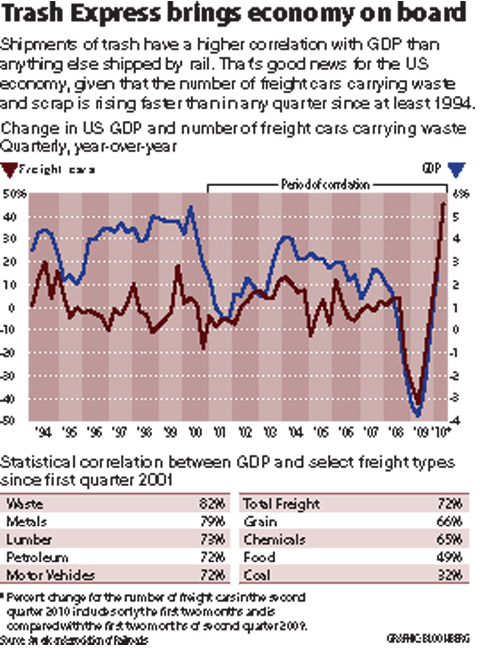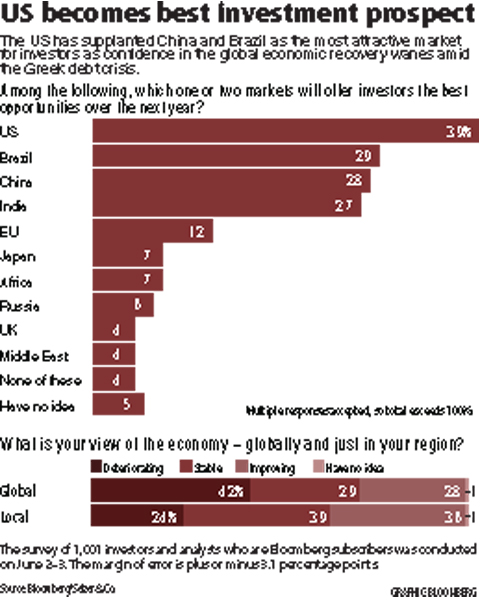US stocks ended a volatile week on the upside on Friday, with investors worrying about the global recovery and facing a new batch of housing and inflation data on the world’s largest economy.
“Financial markets continued to thrash around ... as investors remained generally risk-averse and indecisive about how the future would unfold,” US economists at IHS Global Insight said in a note to clients.
“These fears were exacerbated by the usual pundits proclaiming that the economic Armageddon that they had predicted for 2009, while delayed, would indeed finally explode onto the scene in the second half of 2010,” economists Nigel Gault and Brian Bethune said.

Over the week, the Dow Jones Industrial Average rose 2.51 percent to 10,211.07 points. The blue-chip index seesawed between losses and gains through Thursday, finally closing higher for a second day running on Friday.
The tech-rich NASDAQ rose 1.10 percent from the previous Friday to 2,243.60 points.
The Standard & Poor’s 500 index, a broad measure of the markets, advanced 2.51 percent over the week to 1,091.60 points.

“It is pretty simple why the market got an uptick percent this week — because the week was relatively absent of any macroshocks coming from the eurozone,” Craig Peckham at Jefferies said.
Market sentiment improved slightly on the eurozone, where Greece’s debt crisis has exposed the troubled finances of other members of the currency-sharing bloc and sent the euro tumbling against the US dollar.
The BP oil-spill crisis in the Gulf of Mexico, the worst environmental disaster in US history, was expected to loom large again over the markets.
The British oil giant’s share price has plunged by as much as 49 percent, wiping tens of billions of dollars off its market value, since the BP-operated Deepwater Horizon rig sank on April 22 after a deadly explosion two days earlier.
The oil well continues to spew massive amounts of crude into the Gulf that have defied attempts at firm estimates.
The disaster has hammered other energy shares and raised speculation about BP’s long-term viability.
The markets likely will keep a close eye on the political ramifications of the crisis as US President Barack Obama’s administration and Congress hold meetings with BP leaders. The round began yesterday with Obama holding talks with British Prime Minister David Cameron by phone about the oil spill.
The White House summoned BP chairman Carl-Henric Svanberg to a meeting with Obama in Washington on Wednesday.
Investors will have a full calendar of economic data to scan in search of the direction of the world’s largest economy.
Wednesday will be charged, with reports due on last month’s housing starts and building permits, wholesale inflation and industrial production.
On Thursday, weekly initial jobless claims will provide a snapshot on the troubled labor market, where the unemployment rate stands at 9.7 percent.
Consumer prices data on the same day will round out the inflation picture, while the Conference Board’s index of leading economic indicators may shed some light on the recovery outlook.

TECH EFFECT: While Chiayi County was the oldest region in the nation, Hsinchu county and city, home of the nation’s chip industry, were the youngest, the report showed Seven of the nation’s administrative regions, encompassing 57.2 percent of Taiwan’s townships and villages, became “super-aged societies” in June, the Ministry of the Interior said in its latest report. A region is considered super-aged if 20 percent of the population is aged 65 or older. The ministry report showed that Taiwan had 4,391,744 people aged 65 or older as of June, representing 18.76 percent of the total population and an increase of 1,024,425 people compared with August 2018. In June, the nation’s elderly dependency ratio was 27.3 senior citizens per 100 working-aged people, an increase of 7.39 people over August 2018, it said. That

‘UNITED FRONT’: The married couple allegedly produced talk show videos for platforms such as Facebook and YouTube to influence Taiwan’s politics A husband and wife affiliated with the China Unification Promotion Party (CUPP) were indicted yesterday for allegedly receiving NT$74 million (US$2.32 million) from China to make radio and digital media propaganda to promote the Chinese government’s political agenda and influence the outcome of Taiwan’s elections. Chang Meng-chung (張孟崇) and his wife, Hung Wen-ting (洪文婷), allegedly received a total of NT$74 million from China between 2021 and last year to promote candidates favored by Beijing, contravening the Anti-Infiltration Act (反滲透法) and election laws, the Chiayi District Prosecutors’ Office said. The couple acted as Beijing’s propaganda mouthpiece by disparaging Hong Kong democracy activists

EARLY ARRIVALS: The first sets of HIMARS purchased from the US arrived ahead of their scheduled delivery, with troops already training on the platforms, a source said The Ministry of National Defense (MND) yesterday said it spotted 35 Chinese military aircraft, including fighters and bombers, flying to the south of Taiwan proper on the way to exercises in the Pacific, a second consecutive day it has reported such activities. The Chinese Ministry of National Defense did not respond to a request for comment on the missions, reported just days before tomorrow’s US presidential election. The US is bound by law to provide Taiwan with the means to defend itself. Its arms sales to Taipei include a US$2 billion missile system announced last month. The MND said that from 9am yesterday,

A Control Yuan member yesterday said he would initiate an investigation into why the number of foreign nationals injured or killed in traffic incidents has nearly doubled in the past few years, and whether government agencies’ mechanisms were ineffective in ensuring road safety. Control Yuan member Yeh Ta-hua (葉大華) said in a news release that Taiwan has been described as a “living hell for pedestrians” and traffic safety has become an important national security issue. According to a National Audit Office report released last year, more than 780,000 foreign nationals were legally residing in Taiwan in 2019, which grew to more than